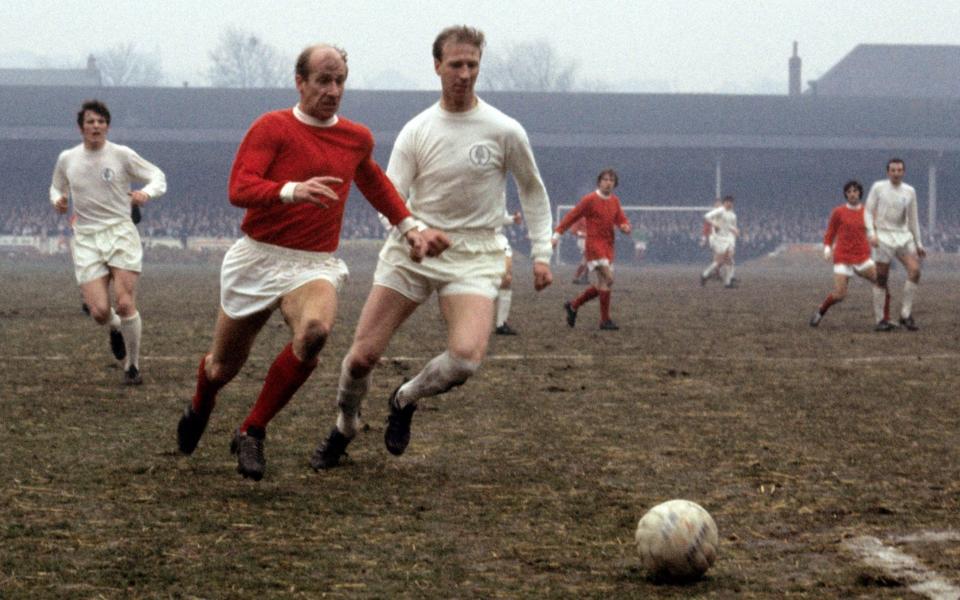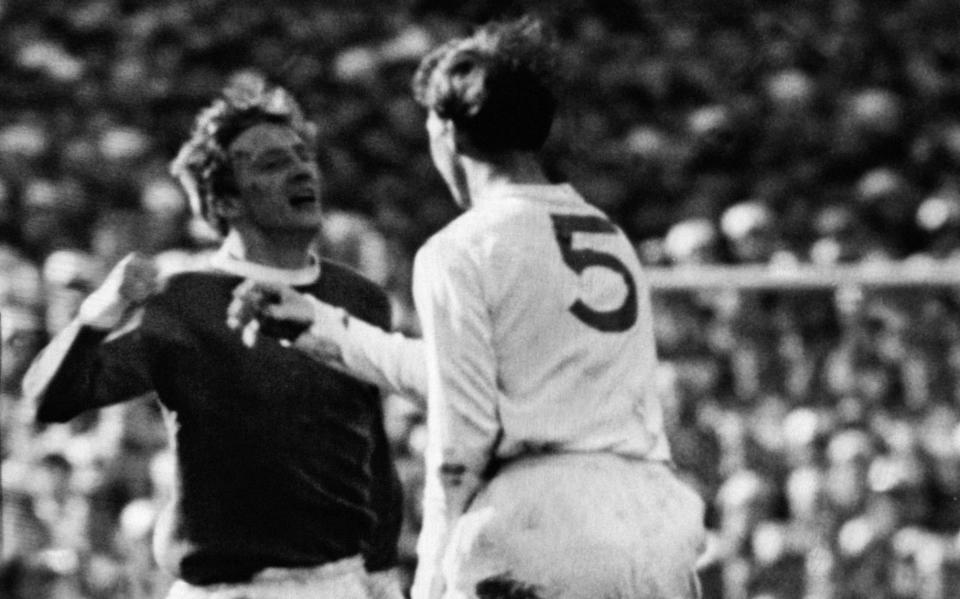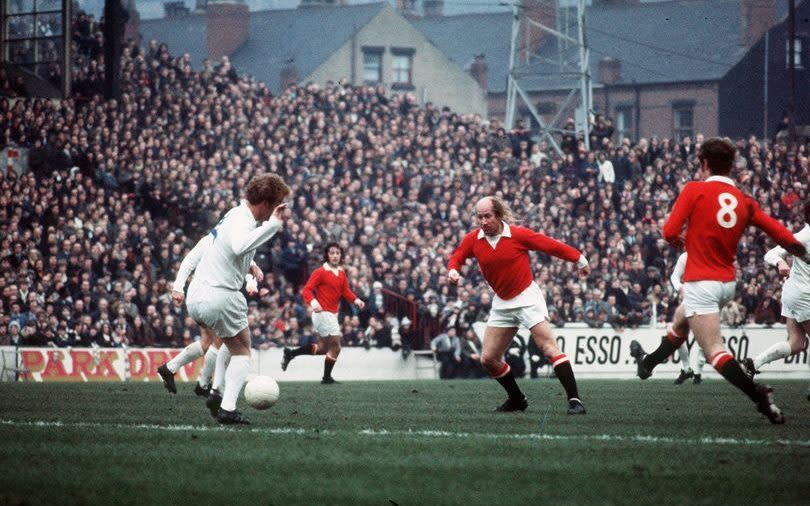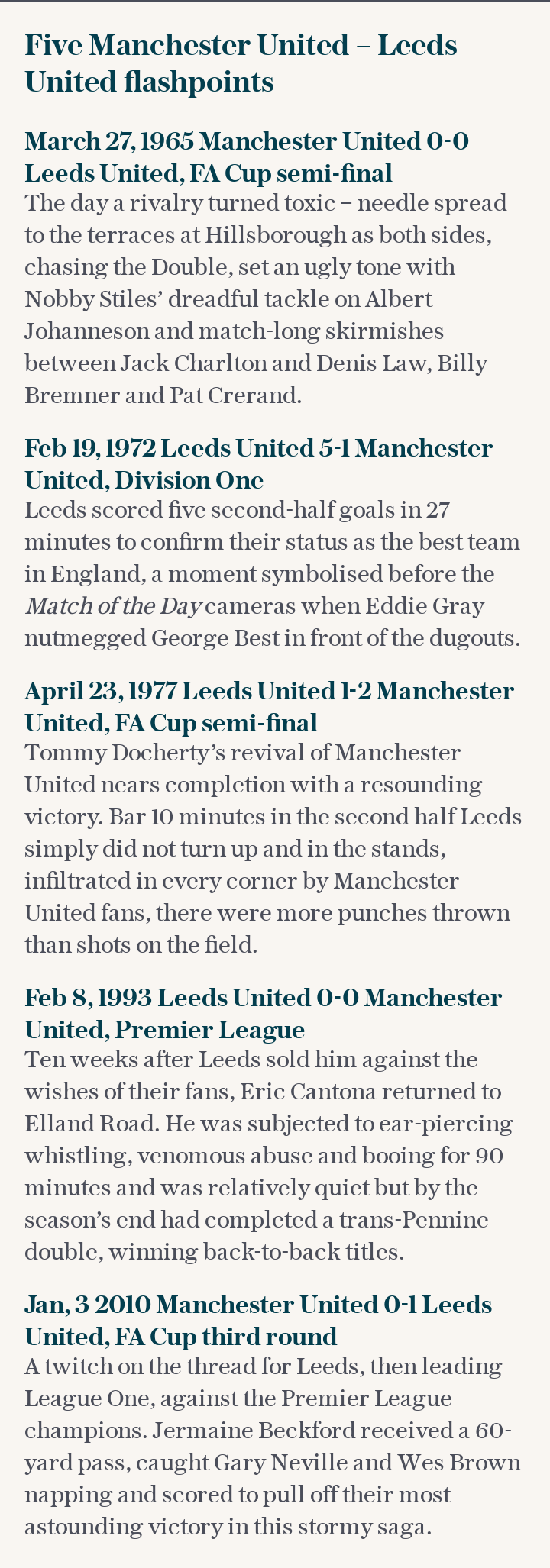Man Utd v Leeds: The inside story of English football's most toxic rivalry

Wembley 2011, and Manchester United are playing in their third Champions League final in four years. They are taking on Barcelona at their peak: Xavi, Andres Iniesta, Lionel Messi, David Villa et al. But just before the teams come out from the tunnel, what are the Manchester United fans singing to the tune of the Piranhas Tom Hark? “We all hate Leeds scum.” Seven years after they last met in a league match and with Leeds only a year back in the Championship after three in League One, their name, albeit in defamation, was ringing out before the biggest match of the season.
When they resume their rivalry at Old Trafford on Sunday, 16 years after Leeds’ last Premier League visit, the team will at last be there in person. But in one respect the club have never really been away. Barely a home match has gone by without that song being given an airing.
Long after they were relegated and effectively consigned to irrelevancy, a mutual loathing kindled for 40 years was sustained by a belief that the other club and their supporters epitomised everything they despised.
It was not always thus. Some have claimed that the antipathy is an entrenched remnant of the Wars of the Roses, as if which side one’s birthplace was on in 1455 still defines identity and inspires bile. Yet in 1950 when Leeds were playing at Highbury in the FA Cup quarter-final and Manchester United were at Stamford Bridge, newspaper reports state “the men of the white and red roses met in friendly rivalry in Trafalgar Square” during their morning sightseeing trips after arriving early in the capital on overnight trains and coaches. It is not a sentence that could have been written in the past 55 years.
The first flickerings came in 1964 when newly-promoted Leeds, in third, beat the leaders 1-0 at Old Trafford. As the two teams lined up in the tunnel, George Best remembered: “I felt a terrific pain in my right calf as someone kicked me with brute force. It was Bobby Collins. ‘And that’s just for starters, Bestie,’ he said.” Nobby Stiles, Best’s protector-in-chief, later took his revenge. “Every time you come down our right side and kick George, you filthy b------,” he shouted at Collins after slamming him into the perimeter wall in a forceful tackle, “I’m going to f------ well hit you like that, only harder.” Leeds’ captain got up to score the only goal of the game.
When they were drawn to face each other the following March in the FA Cup semi-final, Leeds were level on points with first-placed Chelsea and Manchester United a point behind. Talk of winning the Double was rife and it got to Manchester United more than Leeds. Albert Johanneson was kicked from pillar to post, Stiles and Denis Law were booked and Law played the final 20 minutes of the game with a ripped jersey hanging off one shoulder after a mass shoving and grappling scuffle following his foul on Jack Charlton. The hostility during the match and at its end when it finished 0-0 spread down the ginnels and tight streets around Hillsborough as supporters carried on the battle by proxy. The Times’ correspondent, with a nod to the Mersey, called it “A hard day’s dirt”.

As if chastened by the criticism, the replay at the City Ground was a riveting match, one marred by punch-ups on the terraces, but markedly less violent on the field. Leeds won it with Billy Bremner’s 89th-minute header and when John Giles tried to console his brother-in-law and former Manchester United team-mate Stiles at the final whistle, it was the only time Stiles, Giles says, ever told his greatest pal to “f--- off”. In neighbouring dressing rooms afterwards, Jack Charlton and Stiles learnt that they had been picked for England for the first time. Seventeen months later, Jack of Leeds and Bobby and Nobby of United would together become World Cup winners.
Manchester United went on to pip Leeds to the title, their first since the Munich Air Disaster, on goal average and Don Revie’s side took the unwanted double, runners-up in league and Cup. Up until the Reds were relegated in 1974 on the day the Whites were crowned champions, as Leeds enjoyed the upper hand on the pitch with only three defeats in 25 games, trouble between the supporters intensified; it then took a more savage turn still on their return after the Reds' year of pandemonium in the Second Division.

After the transfers of Joe Jordan and Gordon McQueen from Leeds to Manchester United within weeks of each other in 1978, ill-feeling deteriorated further, exacerbated by McQueen’s parting shot: “Ask all the players in the country which club they would want to join and 99 per cent would say ‘Manchester United’. The other one per cent are liars.” For the next four years Leeds fans appropriated the Jilted John song to serenade the pair with “Gordon is a moron” and “Jordan is a moron” whenever the two sides met. Eric Cantona, Rio Ferdinand and Alan Smith subsequently followed their path and receive equal billing in the Elland Road ‘Judas’ hall of shame. In truth only Cantona had the genuinely transformative effect that Giles and Gordon Strachan had at Leeds when moving the other way.
Even before Strachan captained Leeds to the title in 1992, Sir Alex Ferguson was always wary of Elland Road. “His team-talk was always the same,” said Lee Sharpe. “Get in there, get a result and get out as quickly as we can because we are not welcome here.” Gary Neville agrees. “I got treated worse at Anfield. But there was more hostility at Leeds,” he said before adding a dark flipside to the old Billy Fury hit by calling it “a monstrous place”.
Those sickened by the tit-for-tat provocation, of supporters exploiting the worst tragedies suffered by the other club as taunts, will rightly condemn how far it sank, fuelled by a perception of media bias, the monopolisation of their common name, ‘United’, and resentment at the virtual canonisation of Sir Matt Busby and the vilification of Don Revie. But for those of us in attendance, the atmosphere, febrile in menace, were among the most exciting ever experienced at matches and the wins savoured all the more for it.

This reunion behind closed doors will rob it of much of that and affords, perhaps, a moment to pause and think of old ties – Revie visiting Busby at Old Trafford in the first week after becoming Leeds manager in 1961 to seek his advice, Sir Bobby Charlton regularly going to watch his brother play and vice versa until they fell out, the Stiles-Giles families and their grief at Nobby’s death in October.
And the nobility of Ferguson himself, who once spoke of having to speed away from “20 or 30 Leeds skinheads” outside the ground, offering unwavering support to his friend Howard Wilkinson when the Leeds job was slipping away and making sure he was there in the lion’s den to pay his respects at Billy Bremner’s funeral. This fixture has rarely been edifying but there is more mutual respect – for Marcus Rashford and Marcelo Bielsa – than before which might elevate the tone … at least until normal hostilities can be resumed.
Rob Bagchi is the author of The Biography of Leeds United (Vision Sports Publishing, £20). Available at Telegraph Books for £16.99

